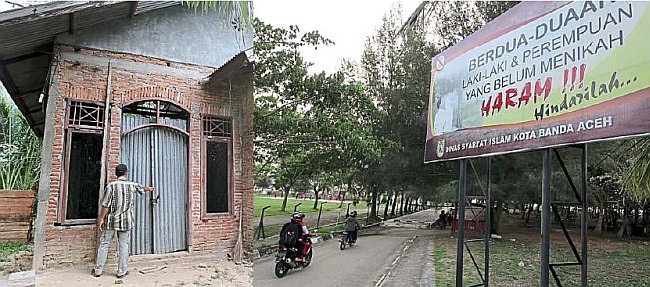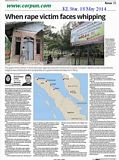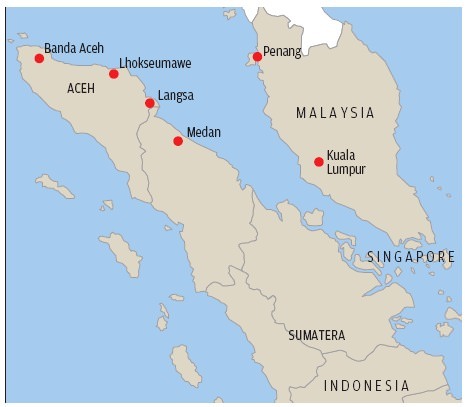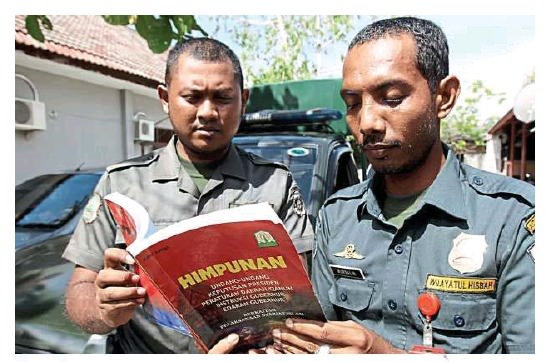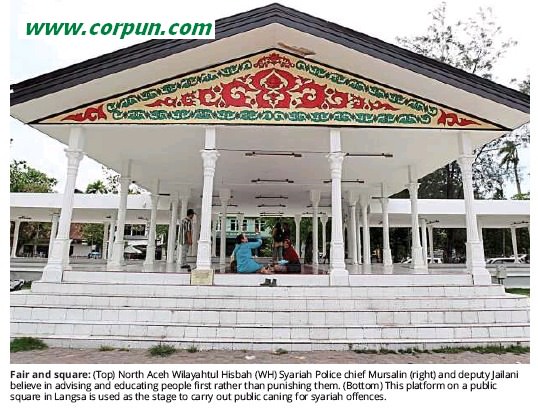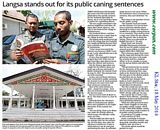Corpun file 25317 at www.corpun.com
The Star, Kuala Lumpur, Malaysia, 18 May 2014, p.23
When rape victim faces whipping
The plight of the woman in Aceh who was raped but was then sentenced to public caning for adultery under the province's religious law underscores the complexities of a system where two laws are in force.
By Shahanaaz Habib
Pictures by Ibrahim Mohtar(extracts)
MOHD Nasir was elected the head of Lhok Bani village in Langsa only 10 months ago -- and already he is facing what he describes as "the biggest test of my life."
Two weeks ago, a group of youths on their way home after watching a late night football match became suspicious when they neared the home of Yus, a 25-year-old divorcee and a single mother of two.
Believing she was having an illicit relationship -- which is strictly forbidden in Muslim-majority Aceh under its syariah law -- the young vigilantes stormed in.
When they found a man hiding in the cupboard, they tied him up, locked him in the cupboard, and then allegedly took turns to rape Yus.
Serious matter: (Left) Yus was allegedly caught by some youth and accused of having illicit sex in this house and then gang raped by the vigilantes at Lhok Bani village in Langsa.
(Right) A billboard carrying a warning against adultery in Banda Aceh.
As dawn broke and Mohd Nasir got ready for the subuh prayers, he received quite a shock when the bunch of youths came and handed him the bedraggled couple, saying they had caught the duo committing adultery.
They had thrown water and heaped dirt and sewage on the two before bringing them to the village head.
Mohd Nasir says Yus was in her nightwear and the man she was caught with was a stranger to him.
"To say I was in shock is to put it mildly. My mind was in chaos and all over the place. I have not been in the post more than 10 months and such a thing happens," he says.
Mohd Nasir, who declined to be photographed, says he called the local Wilayahtul Hisbah (WH), the syariah police, who quickly took the couple away.
But there was another shock awaiting Mohd Nasir.
Two days later, the police came calling, saying that eight youths from the village had allegedly raped Yus that morning after they caught her alone with the man in her house.
"I was horrified to hear this. The boys are only 19- and 20-year-olds and there is also a 13-year-old. They didn't say anything about this when they brought her to me."
Three of the youths were detained by police. The other five have fled.
Mohd Nasir says the families of the eight youths are now stressed and traumatised.
"Rape is far more serious than adultery," he says, adding that the boys are educated and should be able to tell right from wrong.
[...]
One of Yus' close relatives in the village who does not want to be named for fear she would be called to testify in court has mixed feelings over what happened.
"I don't think Yus can ever come back and live here again. We are angry with her. She has no more friends in the village," she says.
But after a while, she cools down enough to say how she really feels about the alleged gang rape.
"I hear there are actually 10 who raped her and they are just boys and still wet behind the ears!
"Yus couldn't even shout for help because they covered her mouth and threatened her. I feel so sad when I think of how much pain she must have suffered being gangraped," says the relative who lives just metres from Yus' house but slept through the incident.
"What is even sadder is that the boys who did it are people we know. They are our neighbours and some are even relatives," she says. Aceh has two legal systems. One is the Indonesian Penal Code which is used throughout the country and covers criminal acts including murder, rape, robbery, kidnapping and other serious crimes. These are heard in civil courts and carry jail sentences upon conviction.
The second legal system is unique to Aceh -- Qanun Jinayat, a syariah-based code and law.
But this covers only three key offences namely gambling, drinking alcohol, and khalwat or/and zina (close proximity and adultery).
Offenders are caught by WH (pronounced "wee ha" for short) or by selfappointed vigilantes who hand offenders over to the syariah police.
The case is then heard in a Syariah Court and punishments meted out consist of fines and public caning. There is no jail sentence.
The Syariah Law has recently been beefed up, given more teeth and broadened to include non-Muslims, but this is controversial and has yet to be implemented.
The syariah police also regularly haul up and reprimand people for other "morality offences" like women wearing tight clothes or trousers and not covering their hair, men for wearing shorts that expose the knees, not attending Friday prayers or eating or selling food during Ramadan; male youths for sporting punk hair-styles or long hair, torn jeans, or wearing earrings. Schoolchildren playing truant are not spared either.
In one or two provinces in Aceh, women are not allowed to wear trousers (because it is seen as male attire) or to sit astride on a motorbike because this is deemed indecent. So they have to sit side-saddle when riding pillion.
In the case of Yus, the Langsa Syariah Police head, Ibrahim Latif, announced very early on that she and her male companion Wah (a 40-year-old married man) would be publicly caned because they had confessed to adultery.
But this has raised an outcry. An alleged rape victim may be further humiliated by being publicly caned for adultery.
Kuala Syriah lecturer of law, social science and politics Saifuddin Bantasyam, however, points out that people must understand that there are two laws systems at work here, and that the rape will be investigated under the Indonesian Penal Code while the adultery will be dealt with under the Acehnese Qanun Jinayat.
So, he says headlines such as "Woman Raped by Eight Men Will be Caned by the Syariah Police", as carried by some international media on the case, were "provocative" and not accurate because both offences are being dealt with separately through the two different legal systems.
"But I criticise the Langsa government for being very reactive in dealing with the caning of the woman. There is no need for them to disclose to the media so early that the woman would be caned," he says, adding that on the flip side, the authorities are not seen to be dealing with the gang rape issue as quickly.
"This is making people question the judgment of the (Langsa) government," he says.
[...]
Corpun file 25318 at www.corpun.com
The Star, Kuala Lumpur, Malaysia, 18 May 2014, p.25
Langsa stands out for its public caning sentences
THIRTY-SEVEN-year-old Sharmila gets teary and a bit scared when asked about the syariah sentence for her husband Agussalim M. Yamin. He is to be caned five times in public for a gambling offence.
"He was caught somewhere else and my neighbours and other villagers don't know about it," she says in her home in her village in Lhoksemauwe.
Her husband drives a trishaw and Sharmila runs a small shop in the village to make ends meet.
She hoped word would never get out in the village that her husband was caught gambling because they have nowhere to go and fear public humiliation.
"I don't know how much the amount was because I didn't want to ask. I only advised him not to do it again," she says.
In fact, they managed to keep it so quiet that even their new village head Ibnu Agus did not know about the offence and sentence.
But the thing is Agussalim was caught for the offence about two years ago and was sentenced to public caning by the Syariah Court on Aug 13, 2012. The sentence has yet to be executed.
In fact, none of those who have been sentenced to public caning by the Syariah Court in Lhokseumawe in the past two years have had their sentences carried out.
Most of the other districts in Aceh -- except for Langsa -- have also not executed the sentences in the last two years.
But it is not for lack of desire to do so. The main reason is a lack of funds.
Edwardo from the Attorney's Office in Lhoksemauwe admits there were problems in the implementation of the syariah sentences.
"For one thing, there is no detention order for syariah offences which means the offender walks away scot free.
"And he might not show up in the syariah court for the sentencing. Or if he does, then after the sentence is meted out, it takes a while before it can be executed and during this time, the offender might move or run away. When the authorities want to execute the sentence, they can't find him," he says.
Then there is the question of cost for the public caning.
"The Syariah Court just hands out the sentence. It is not its business to look into whether there are funds to carry it out. Money is needed for a public caning because it is a ceremony. They need to erect a stage, rent chairs for the officers, pay the person who is doing the caning. There is no allocation or budget here for it," he says.
Kuala Syriah Law lecturer Saifuddin Bantasyam estimates that the cost for public caning was around seven million to 10mil rupiah (RM1,998 to RM2,854).
This is because apart from erecting the stage and renting the seats, provisions also have to be made for security and for a medical officer to be on standby to examine the person before and after the caning.
"The government has no money for the execution of the sentences so those sentenced go free, especially at the district level, because the case goes to the district authority and there are no funds."
Edwardo says changes were made in Aceh's Syariah Law Qanun Jinayat 2013 recently which would allow for detention.
"But this would also incur costs because if you detain an offender, then you have to provide him with meals. All this adds up," he says.
The syariah law in Aceh is confined to three offences -- gambling, drinking alcohol and khalwat/zina (close proximity/adultery).
While the other provinces have been rather sluggish in carrying out public caning, Langsa, which is only 171km from Medan, stands out for executing a high number of its public caning sentences.
It carried out 13 public canings in 2012 and four in 2013.
Asrul, a journalist in Langsa who has covered the canings, says thousands, including women and children, turn up to see it.
The whole square would be packed, he says.
About this website
Search this site
Country files: Judicial CP in Indonesia
Archive 2014: Indonesia
Video clips
Picture index


